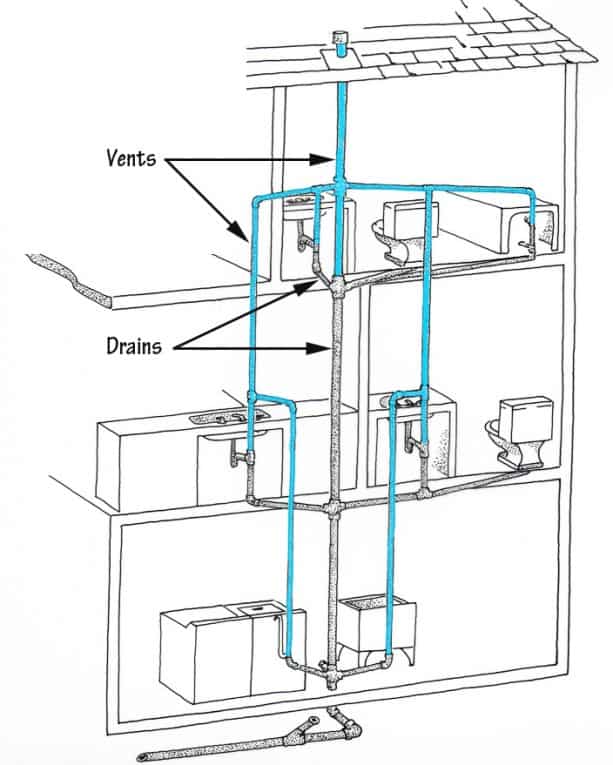
DrainWasteVent Plumbing Systems
Branch vents must rise to a height of at least 42 in. above the floor before beginning their horizontal run to the vent stack. This measurement adds a safety margin of 6 in. above the height of the highest fixture (such as a sink set at 36 in.), so there is no danger of waste flowing into the vent.
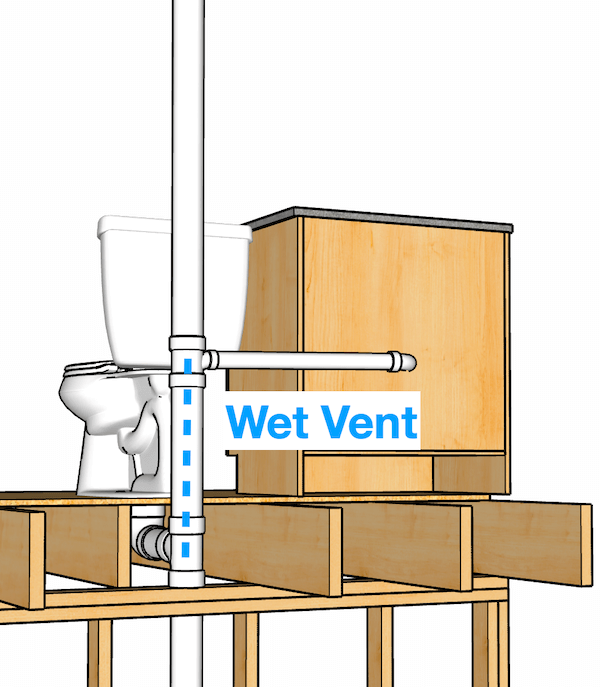
Plumbing Vents (The Ultimate Guide) Hammerpedia (2023)
Here's a brief summary of what plumbing vents do, the types, sizes, and diagrams: Plumbing Vents: What They Do Role: Plumbing vents serve to equalize air pressure within the drainage system, allowing wastewater to flow freely and preventing traps from siphoning. They also vent sewer gases safely outside.
:max_bytes(150000):strip_icc()/venting-multiple-sinks-diagram-d2bf3b8b-5d1e6511953c46bcbd86f3671213e901.jpg)
Everything You Need to Know About Venting for Plumbing Work
Section 2: Anatomy of a Plumbing Vent Diagram 2.1 Vent Stacks: The vent stack lies in the center of a plumbing vent schematic. This vertical pipe lets air into the plumbing system and runs from the roof to the drainage system. It is essential to keep the right pressure balance in the pipes. 2.2 Branch Vents:

Kitchen Sink Plumbing Diagram With Vent What Does The U Shaped Pipe Under A Sink Do Wm
Power saw Level Basic carpentry tools Pipe strap Fitting to join to existing drainpipe Materials PVC pipe and fittings to meet codes PVC primer and cement Instructions Choose a Toilet Vent or Drain Configuration Toilet Vent Option 1: Indirect Connection

Bathroom Plumbing Venting Bathroom Drain Plumbing Diagram, house behind house designs
Introduction Welcome to our comprehensive guide on plumbing vent diagrams and tips for planning your remodel. When it comes to bathroom or kitchen renovations, understanding the importance of plumbing vents is crucial.
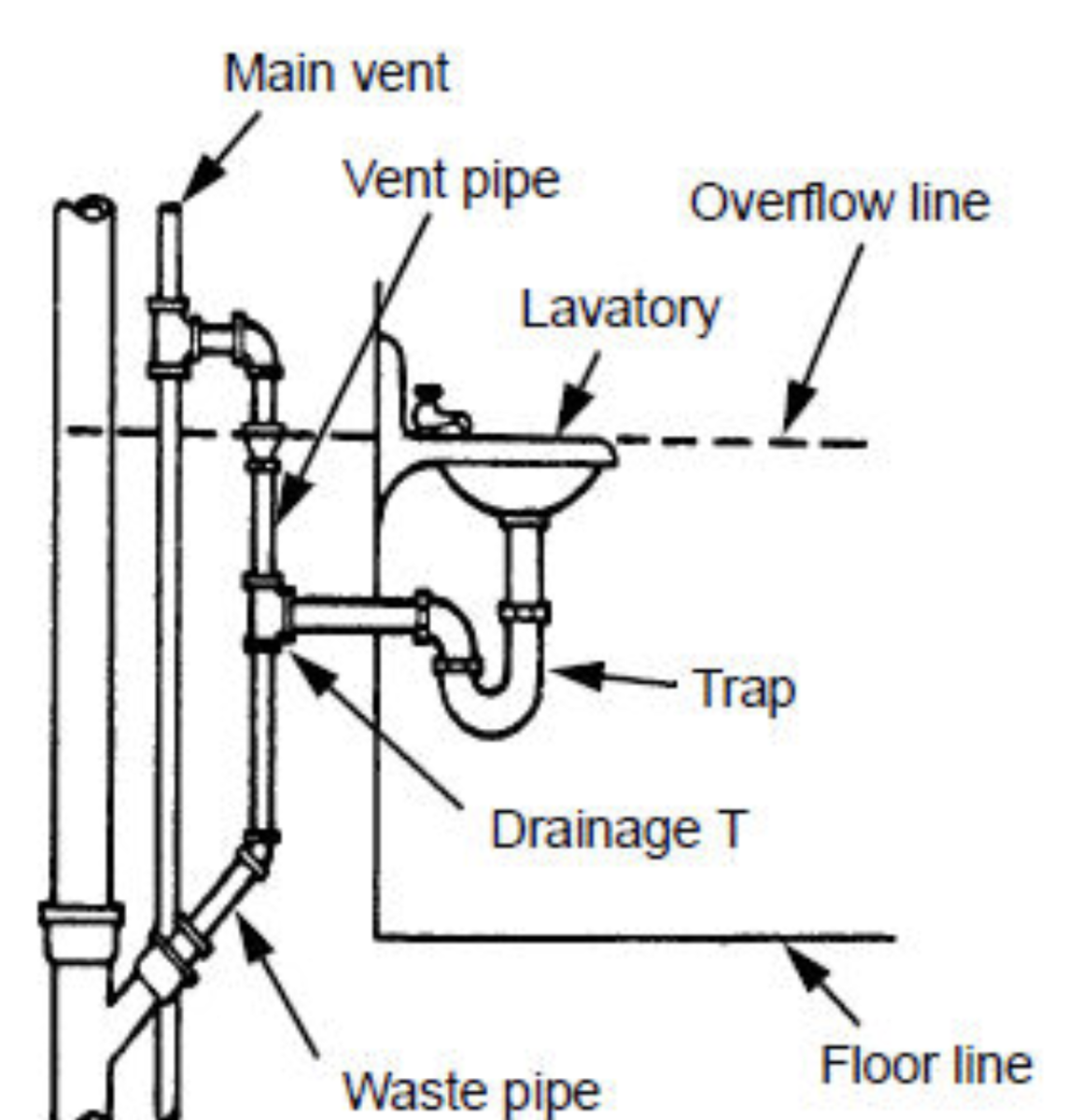
How and Why to Vent Your Plumbing Dengarden
Step One: Identify the highest point in your drainage pipe. This is where you'll install the loop vent. Keep in mind that the loop vent must be at least 4" higher than the top of the waste pipe. Step Two: Cut a hole in the pipe at the highest point. Step Three: Attach the loop vent to the pipe and seal it with silicone caulk or another type.

plumbing How many vents are required for drains under a slab and what locations? Home
The Ultimate Guide to Bathroom Plumbing Diagrams and Layouts Planning a bathroom remodel? Before you start construction, see our tips and information on bathroom plumbing and materials. By Caitlin Sole Updated on July 29, 2022 Before deciding on a shower head, a few more critical decisions must be made in a bathroom remodel.

Master Bath Plumbing Diagram Zoe Plumbing
collection point for vent pipes so that a single roof penetration can be made. Keep in mind that "stack vents" and "vent stacks" are distinct. See definitions in the next section. The example illustrates a typical vent stack compared with the special Waste Stack Venting system. Methods of Venting Plumbing Fixtures and Traps in the 2018.
Plumbing Vent Pipe Diagram General Wiring Diagram
By using a plumbing vent diagram, you can easily check the built-in pipes inside your walls. The best way is to start by checking the pipes under your sink. You'll notice that there is a P-shaped tube that is located directly underneath the drain. That P-trap tube starts the ventilation process.
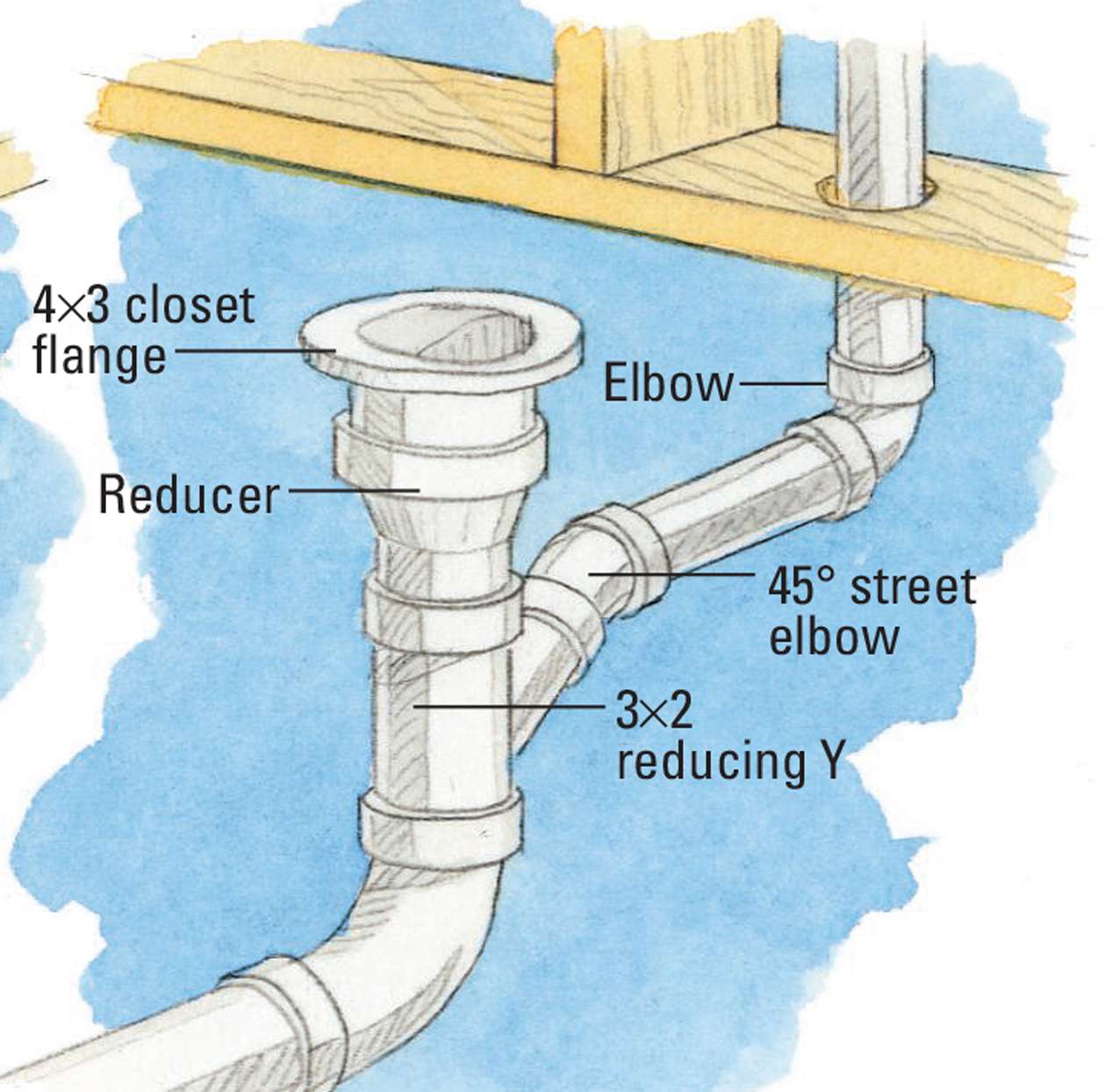
How to Run Drain and Vent Lines for Your DIY Bathroom Remodel Better Homes & Gardens
Below is a plumbing vent diagram that shows a visual representation of the plumbing vent layout. Plumbing Vent Diagram. Credit to Mr. Fix-It. Why is a plumbing air vent important? A plumbing air vent is important because it allows air to enter the system and allows sewer gases to escape. In other words, it allows the atmospheric pressure to.
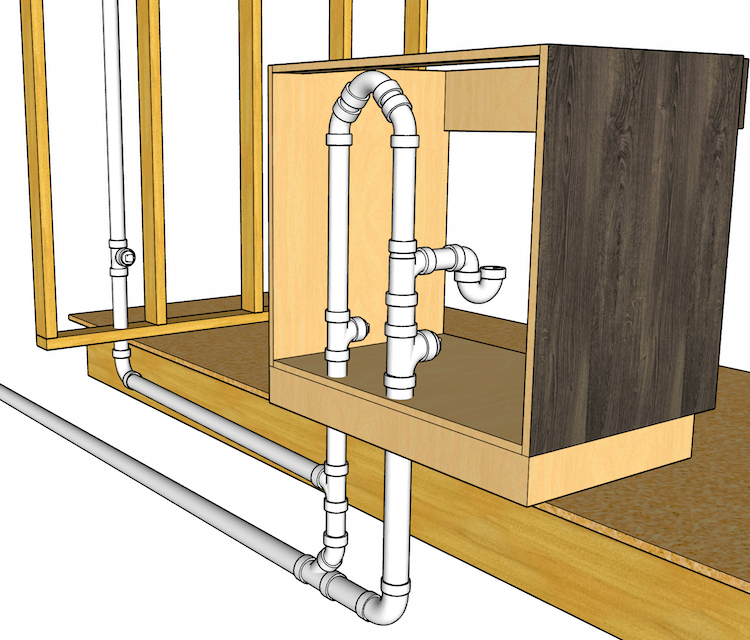
Plumbing Vents (The Ultimate Guide) Hammerpedia (2022)
Figuring out the plumbing vent diagram and layout is one of the first steps for a new appliance or an addition to your system. However, it's not always easy to find a solution. developing a plumbing vent diagram and system plan, you can choose from several venting types, and each option may present problems or complications.

plumbing How many vents are required for drains under a slab and what locations? Home
A rough-in plumbing diagram is a simple isometric drawing that illustrates what your drainage and vent lines would look like if they were installed, but all of the other building materials in your house were magically removed.
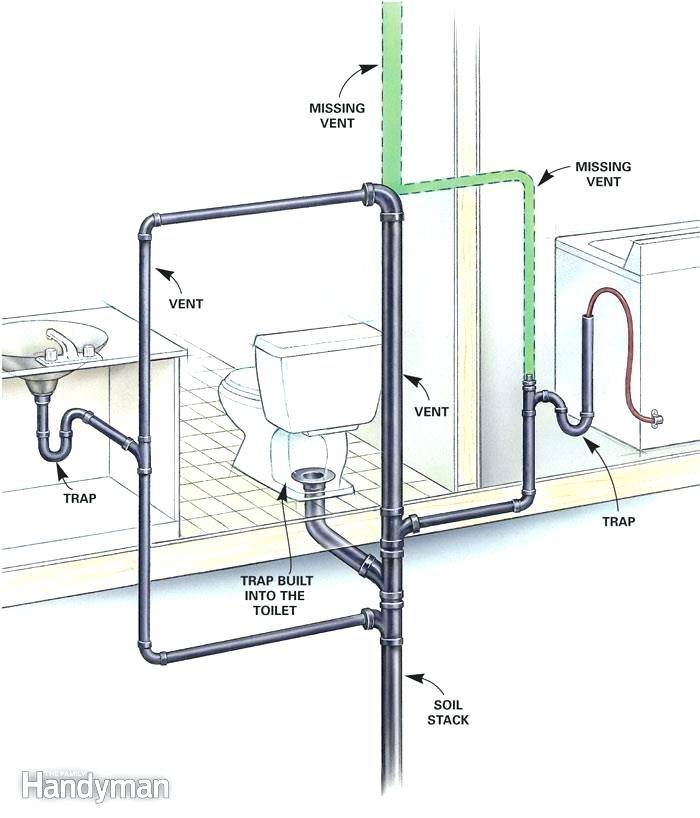
plumbing vent problems
Visualizing the pipes inside your wall (using a plumbing vent diagram) is made easier if you start from where you can see. You've opened up the cabinets under a sink before to see the P-shaped tube directly underneath the drain, right? It's called the P-trap, and it starts the sewage/ventilation process.
Venting configuration Plumbing
To help answer this important question, look at the plumbing vent diagram below: Notice the floor 1 bathtub has no vent. As waste flows down a stack, it draws air with it. The moving air also draws nearby fluids… This is called the boundary layer effect.

Venting the plumbing in an island sink
Connecting the sink and the waste drainpipe. Selecting the configuration of the vent pipe. Attaching the pipe to the opening. Drawing a chalk line to the wall studs' sides to reflect the length of the drain. Drilling a 1 ¾ -inch hole through the middle of each wall stud. Adding a second elbow fitting.
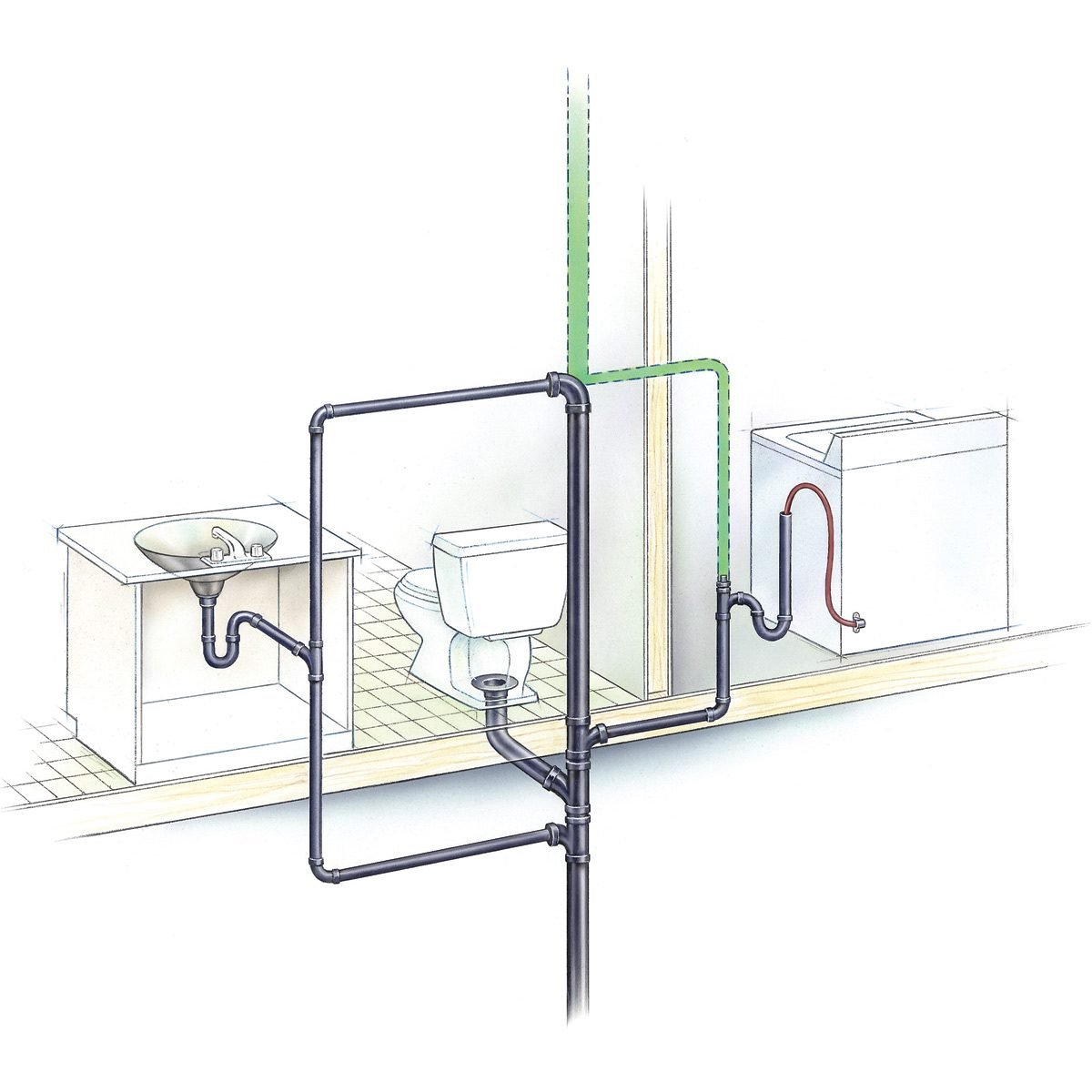
Plumbing Vents Common Problems and Solutions Family Handyman
In other words, if the fixture unit total would require a 3-inch-diameter (76 mm) drain per Table 913.4, then both the stack and its vent must be 3 inches (76 mm) in diameter with no offsets at all until at least 6 inches (152 mm) above the highest branch interval (see diagram).